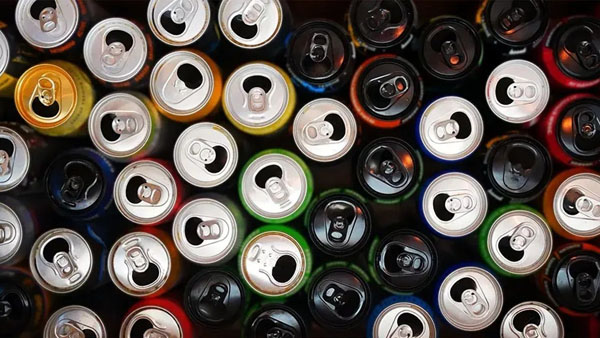By Satyabrat Borah
Brightly colored cans of energy drinks that promise a quick boost of focus, stamina or just enough pep to get through a long day are commonplace these days. These drinks have grown popular among professionals who are pushing through deadlines and students who are studying for tests. What occurs, though, if you start drinking energy drinks every day?
Imagine that you are dragging at 2 p.m. Perhaps you had a rough night’s sleep or have a ton of work to do. The initial taste of your favorite energy drink hits like a spark when you open the can. Your brain becomes sharper, the coffee takes effect, and you’re suddenly prepared to take on the world. Energy drinks work like that, so it’s no wonder they’re so well-liked. The caffeine content of most energy drinks is high, ranging from 80 to 200 mg per serving, or around one or two cups of coffee. They are more than simply caffeine, though. They contain a lot of sugar or artificial sweeteners, taurine, guarana and B vitamins, among other substances.Together, these ingredients give them their distinctive kick, but when you start consuming them regularly, your body begins to detect the impacts in unexpected ways.
There’s a reason why people continue to go for these cans, so let’s start with the positive. The main character, caffeine, is a stimulant that has been thoroughly researched. It gives you an alert, focused sensation by blocking adenosine, a chemical in your brain that causes drowsiness. This can result in increased productivity for someone who regularly consumes energy drinks, particularly during mid-afternoon slumps. These beverages frequently contain B vitamins, which promote energy metabolism and aid in the body’s conversion of food into fuel. Although research is still in its infancy, taurine, another prevalent component, may enhance cognitive function and lessen weariness. And let’s face it, there are times when the custom of opening a cold can is just gratifying, a brief respite from a hectic day.
I recall having a conversation with Raju, a guy who was devoted to his daily energy drink. He worked night shifts, he claimed that starting his shift with a can was like turning on a switch in his head. When patients most needed him, it kept him alert. He valued the cerebral edge and sense of being “on” more than the coffee alone. This is somewhat supported by research, which shows that moderate caffeine consumption might enhance mood, attention span, and reaction time. A daily energy drink could be a lifesaver for individuals like Jake.
This is where things become complicated, though. Because your body is a well tuned machine, it begins to adapt when you give it stimulants on a daily basis. Tolerance to caffeine does exist. In order to counterbalance the effects of consuming 150 mg of caffeine each day, your brain may begin to produce more adenosine receptors. Interpretation? After a while, the energy drink from that same can loses its intensity. To get the same buzz, you might find yourself reaching for a second one or moving to a more powerful brand. Jake began to see issues at this point. One drink wasn’t enough after a few months, and even after downing his preferred brand, he was experiencing jitters, anxiety, and strange fatigue.
This leads us to the less enjoyable aspect of regularly consuming energy drinks. An excessive amount of caffeine might disrupt your neurological system because it is a stimulant. High dosages taken on a regular basis, such as 200 mg or more per day, may cause adverse effects like agitation, heart palpitations, and restlessness. In particular, your heart dislikes being forced into overdrive on a daily basis. Energy drinks have been associated with elevated blood pressure and heart rate, particularly in those with preexisting cardiac problems or caffeine sensitivity. According to a 2019 study published in the Journal of the American Heart Association, energy drinks can trigger irregular heartbeats in certain individuals, including young, healthy adults.It serves as a reminder that your ticker dislikes continuous stimulation, but it’s not a surefire way to get a heart attack.
The sugar comes next. It is present in many energy drinks; some have 30 grams or more per can, which is equivalent to drinking a Coke. It’s a lot of added sugar to your system if you eat one every day. This may eventually lead to insulin resistance, weight gain, and an increased risk of type 2 diabetes. Not even the sugar-free varieties are exempt. Despite not adding calories, artificial sweeteners like aspartame or sucralose can alter your gut flora and sweet tooth, which may result in overindulgence. Sabita, a person I knew, thought she was making a healthier decision by switching to sugar-free energy drinks, but instead she found herself feeling more hungry than normal and nibbling more during the day.
Another consequence of regularly consuming energy drinks is sleep. Because caffeine has a half-life of roughly five hours, at eight o’clock at night, half of the caffeine from your drink at three o’clock is still in your system. You may not be aware of it, but drinking late in the day may be ruining your sleep. Inadequate sleep can lead to more serious problems, such as mood changes, difficulty focusing, and, ironically, increased exhaustion that prompts you to go for another energy drink. A vicious circle exists. Sabita acknowledged that she began to struggle to fall asleep, which increased her need for energy drinks to get through the mornings. It wasn’t until she reduced and saw an improvement in her sleep that she realized what was going on.
Caffeine, taurine, and other stimulants can increase anxiety, particularly if you already have it. According to some research, excessive energy drink consumption may make sensitive people feel more anxious or even cause panic attacks. Not to mention the crash. After the caffeine wears off, you may experience a post-energy drink slump that leaves you feeling exhausted, agitated, or even a touch down. This emotional rollercoaster of highs and lows can become the new normal for regular drinkers, which is detrimental to their emotional stability.
How about in the long run? The fact is that because energy drinks haven’t been around long enough, there isn’t a lot of research on the effects of daily intake over decades. We are aware that consuming large amounts of coffee over time might strain your adrenal glands, which control stress chemicals like cortisol. This could eventually lead to adrenal exhaustion, which would leave you feeling exhausted. You run the risk of overtaxing your liver and kidneys, particularly if you combine energy drinks with alcohol or other substances, which is a highly taxing combination for your body.
Is it prudent to stop using energy drinks altogether? Not all the time. Moderation is the key. Consider cutting back on your daily can to a few times a week or switching to less caffeinated drinks like tea or coffee, which don’t have the same variety of ingredients. Keep in mind the timing as well; avoid drinking them late in the day to protect your sleep. If you feel reliant on that device, it could be a good idea to take a break and see how your body performs without it. Raju and Sabita both found that reducing their consumption enhanced their sleep and provided them with more steady energy, even if it meant depending on other practices like exercise or better meal planning for a natural boost.
Energy drinks aren’t a panacea, but they can be a useful tool. Regular use can change from a short-term boost to a habit that disrupts your sleep, temperament, and even your body’s rhythm. Maybe keep that neon-colored can for when you truly need a spark, but pay attention to your body and mix in some diversity. Your taste buds, heart, and mind will all appreciate it.






